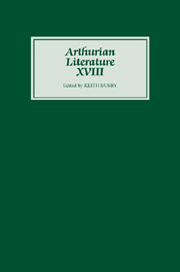Book contents
- Frontmatter
- Contents
- General Editor's Foreword
- I The Composition of the Tristran of Beroul
- II The Lure of the Hybrid: Tristan de Nanteuil, Chanson de Geste Arthurien?
- III L'Extrait du Roman d'Erec et Enide de La Curne de Sainte-Palaye
- IV ‘Talkyng of cronycles of kinges and of other polycyez’: Fifteenth-Century Miscellanies, the Brut and the Readership of Le Morte Darthur
- V Albine and Isabelle: Regicidal Queens and the Historical Imagination of the Anglo-Norman Prose Brut Chronicles
- VI Arthurian Literature, Art, and Film, 1995–1999
V - Albine and Isabelle: Regicidal Queens and the Historical Imagination of the Anglo-Norman Prose Brut Chronicles
Published online by Cambridge University Press: 05 February 2013
- Frontmatter
- Contents
- General Editor's Foreword
- I The Composition of the Tristran of Beroul
- II The Lure of the Hybrid: Tristan de Nanteuil, Chanson de Geste Arthurien?
- III L'Extrait du Roman d'Erec et Enide de La Curne de Sainte-Palaye
- IV ‘Talkyng of cronycles of kinges and of other polycyez’: Fifteenth-Century Miscellanies, the Brut and the Readership of Le Morte Darthur
- V Albine and Isabelle: Regicidal Queens and the Historical Imagination of the Anglo-Norman Prose Brut Chronicles
- VI Arthurian Literature, Art, and Film, 1995–1999
Summary
About four thousand years after the Creation, the king who has conquered all the world marries his thirty daughters to his subject kings, but the princesses conspire to kill their lords and take mastery for themselves. Foiled in their plot and punished with exile, they are set adrift together, arriving eventually at a deserted island, which the eldest sister, Albine, names after herself. The sisters' trials do not end after they settle the isle of Albion: seduced by demons, they give birth to giants and are eventually raped by their own hideous offspring. That is, instead of kings, they have incubi as mates; instead of strapping princes, they have monsters as sons; instead of palaces and prosperity, they have an empty land and not so much as a bow and arrow for hunting. Albine and her sisters think they are too good for kings; for their insubordination, they become the playthings of the non- and sub-human.
This is the beginning of British history as told in the short version of the poem Des Grantz Geanz that is introduced as a prologue to the Short Version of the Anglo-Norman prose Brut chronicle. The prose Brut constituted the first complete history of Britain available to vernacular audiences, who made it the most popular secular, vernacular work of the Late Middle Ages in England. In the first Anglo-Norman prose Brut (which dates from around the turn of the fourteenth century), as in Geoffrey of Monmouth, Brut wins his island realm by killing off the race of giants already inhabiting it.
- Type
- Chapter
- Information
- Arthurian Literature XVIII , pp. 143 - 192Publisher: Boydell & BrewerPrint publication year: 2001



